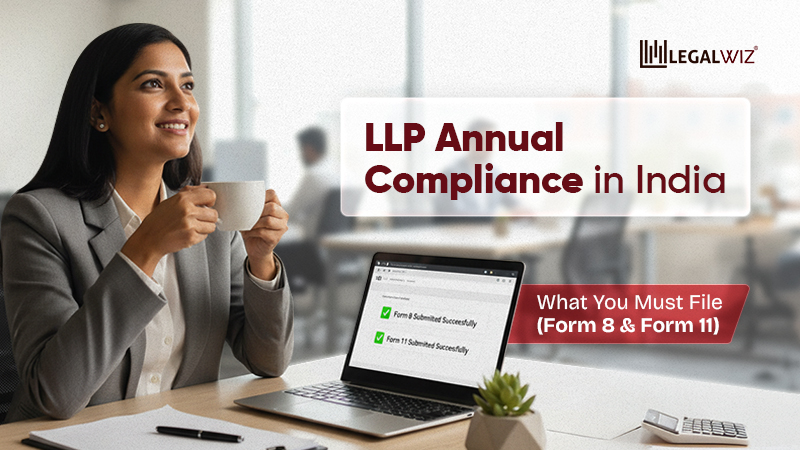LLP Annual Compliance in India: What You Must File (Form 8 & Form 11)
Ignoring LLP compliance is like leaving your phone unlocked in a crowded train—tempting, careless, and expensive. Limited Liability Partnership registration in India gives businesses flexibility, lighter compliance than companies, and protection for partners’ personal assets. But freedom comes with responsibility. Annual compliance isn’t just bureaucracy—it’s the proof that your LLP is alive, organized, and legally sound.
Every LLP in India has to submit specific returns and statements every year. The most important ones are Form 8 (Statement of Account & Solvency) and Form 11 (Annual Return). These papers show that the company is open about its finances and maintains the confidence of regulators.
| Before we delve into compliance, it’s worth understanding how an LLP differs from a traditional partnership. If you’re still on the fence, our blog on the Difference Between Partnership and LLP in India clears up the basics and shows why LLPs have their own reporting rules. |
Non-compliance isn’t minor. Penalties accumulate daily, legal notices disrupt operations, and your LLP’s credibility with investors, partners, and authorities suffers. Repeat defaults can disqualify designated partners or even lead to the LLP being struck off.
With that in mind, let’s break down exactly what LLPs need to file annually and why it matters.
1. What is a Limited Liability Partnership (LLP)?
An LLP is like the best of both worlds: it combines the freedom of a partnership with the legal protection of a corporation. Governed by the Limited Liability Partnership Act, 2008, it gives you structured roles and responsibilities like a traditional partnership, but with a major bonus: limited liability for partners and a separate, perpetual legal existence.
No wonder LLP registration is a favorite among professional and service-based businesses—Chartered Accountants, Company Secretaries, management consultants, recruiting agencies, and similar firms love it. In one tidy, legally recognized package, you receive professional credibility, liability protection, and fewer compliance requirements.
Curious about LLPs? Our expert-led video makes sense of it all—no jargon, no head-scratching. Just a clear, simple breakdown so you finally get what an LLP really is.
What is a Limited Liability Partnership?
2. Key Annual Filings Every LLP Must Know
Annual compliance filings for LLP aren’t simply paperwork; they’re like a yearly check-up for your firm that you didn’t realize it needed. It’s simple: ignore them and welcome several penalties, legal notifications, and a bad reputation for your firm. Or, you can get them right, and your LLP will run smoothly, stress-free, and compliantly.
Well, the choice is pretty simple, isn’t it?
So, let’s go over the filings you can’t ignore, when they’re due, and why they matter.
2.1. What is Form 8 for LLP (Statement of Account & Solvency)?
Think of Form 8 as your LLP’s annual financial selfie, showing off not just your assets and liabilities, but also the health of your business. It proves your LLP is solvent, your accounts are accurate, and there are no hidden skeletons in the closet. Regulators use this filing to verify the financial stability of your company and the accuracy of your partners’ contributions.
- Who files: All LLPs
- Deadline: Within 30 days after 6 months from the financial year-end (October 30 for FY ending March 31)
- Penalty for delay: ₹100/day
Real-life scenario:
Think about two people who own a consulting LLP. They don’t care about Form 8 deadlines because they believe, “It’s just paperwork.” They received a penalty notice six months later, with a fine of ₹100 a day and reminders to pay it. They become really stressed out, and rushing to get their accounts ready at the last minute causes them to make errors, which is precisely what they were trying to prevent by not filing early.
Filing Form 8 isn’t just a chore on the compliance checklist; it’s your LLP’s way of announcing, “Yes, we’re organized, transparent, and thriving.” Think of it as a financial picture that captures how tidy your books are, how steadily your operations run, and how reliable your business looks to the world.
That’s why you need to know everything about the annual filing of LLP Form 8, which is vital—so this annual ritual feels less like a dreaded audit and more like a quick, confident snapshot.
2.2. What is Form 11 for LLP?
Form 11 is your LLP’s annual “hello” to the government—think of it as RSVPing to your own business. It lists partner details, capital contributions, and any changes in the LLP. Even if nothing changed, the authorities expect this yearly check-in.
- Who files: All LLPs
- Deadline: 60 days after the financial year ends (May 30)
- Penalty for delay: ₹100/day
Tip: Keep partner records updated throughout the year. Filing becomes a quick wave instead of a last-minute scramble.
Real-life scenario:
A small consulting LLP skipped how to file the LLP Form 11, assuming “nothing changed, so why bother?” A few months later, their inbox was a parade of penalty notices, and weekends were sacrificed to fix what could’ve been done in one sitting. Filing on time keeps your LLP stress-free, wallet intact, and reputation safe—no awkward “oops” moments with the government.
2.3. Income Tax Filing for LLPs
LLPs enjoy pass-through taxation, meaning profits are taxed in the hands of the partners, but the LLP itself still needs to file its income tax return every year. Think of it as reporting your LLP’s earnings so the government knows you played fair.
Know more about LLP and tax filing here: LLP Taxation: Income Tax & Alternate Minimum Tax (AMT)
- Deadline: 31st July for non-audit cases; 30th September if accounts are audited
- Penalty for delay: ₹5,000–₹10,000 depending on circumstances
Tip: Compliance is sweet, but late taxes are bitter—your wallet will definitely notice.
Real-life scenario:
A boutique marketing LLP decided to push their tax filing to the last week, thinking, “We’ll get it done later.” The last-minute rush led to miscalculations, penalties, and a frantic scramble to file correctly before notices turned serious. Filing on time keeps your LLP stress-free, penalty-free, and your partners happy.
3. Optional or Conditional Filings for LLP Compliance
Not every LLP has the same paperwork, but some filings are conditional based on your business activities or registration. Ignoring them can cost time, money, and credibility.
3.1 GST Annual Return (GSTR-9)
LLPs registered under GST must file GSTR-9, the annual summary that stitches together all monthly or quarterly returns. It acts like a report card, reconciling input tax credits (ITC) with taxes paid and making sure your books align with the government’s records. You can learn everything about GSTR-9 in our detailed guide, where we’ve explained due dates, eligibility, late fees, and more in one place.
Example: Suppose your LLP collected ₹12 lakh GST in a year and claimed ₹4 lakh ITC. GSTR-9 verifies that you’ve correctly reported ₹8 lakh as net GST. Filing inaccurately or late can attract penalties and scrutiny.
3.2 Sector-Specific Annual LLP Compliance
Certain LLPs, like those in finance, healthcare, exports, or other regulated sectors, have additional filings. These can include reports, certifications, or disclosures mandated by industry-specific authorities.
Thus,some LLPs end up with more compliance “homework” than school kids during exam week. Skipping these isn’t optional; it can trigger fines or legal notices.
4. Common Mistakes LLPs Make While Filing Annual Compliance
Even the savviest LLPs can stumble on compliance if they’re not careful. Here are the usual pitfalls:
- Filing late or incomplete forms: Waiting until the last minute often leads to errors or missing information.
- Missing deadlines for Form 8 & Form 11: Deadlines aren’t suggestions—penalties start ticking the moment you’re late.
- Incorrect partner details or financial info: Wrong data can trigger notices, corrections, or even scrutiny from authorities.
Tip: Avoid creating a paper avalanche that could bury your LLP. Keep records accurate, double-check forms, and schedule filings early. A little organization now saves headaches, fines, and frantic late-night filing sessions later.
5. Penalties & Consequences of Non-Compliance
The government loves rules… and fines almost as much. Under the LLP Act, 2008, skipping compliance is not a small slip—it’s a costly affair. Here’s what happens when filings fall through the cracks:
1. Late Filing Fines
Forms like Form 8 (Statement of Account & Solvency) and Form 11 (Annual Return) attract a penalty of ₹100 per day of delay. There’s no upper limit, which means the longer you wait, the heavier the bill. Many LLPs have seen penalties climb into lakhs simply because they didn’t file on time.
2. Disqualification of Partners
Designated partners who fail to ensure compliance can be disqualified from holding such positions in other LLPs or companies. It’s like being benched from the business field—not fun when you’re trying to grow ventures.
3. Legal Scrutiny
Chronic non-compliance can lead to prosecution under the Act, especially if authorities suspect mismanagement or deliberate concealment. At that point, the problem is bigger than just penalties—it’s legal trouble.
4. Credibility Damage
Non-compliance is visible in public records. Banks, investors, and even clients check compliance history before trusting an LLP. Missed filings can look like poor management, making funding and partnerships harder to secure.
Bottom line: Filing on time is always cheaper, smarter, and far less stressful than battling penalties, disqualification, or a dented reputation.
6. Smart Strategies to Stay Compliant
Compliance doesn’t have to be a monster hiding under your desk. With the right habits, your LLP can breeze through annual filings without penalties or panic. Here’s how:
1. Maintain a Compliance Calendar
Deadlines for Form 8, Form 11, GST returns, and tax filings can sneak up on you. A simple compliance calendar with alerts keeps you ahead of the curve. Treat it like your LLP’s to-do list that never forgets.
Also read: LLP Compliance: How to file Annual Return?
2. Hire Professional Help vs DIY Filing
Sure, you can file yourself, but regulations are tricky. A missed detail today can become a penalty tomorrow. Professionals—like CAs or compliance experts—know the system inside out and save you from expensive mistakes.
3. Keep Financials Updated All Year
Don’t dump receipts, invoices, and statements into a drawer for “later.” Update your books monthly. When a Form 8 season comes, you’ll thank yourself.
A stitch in time saves fines and midnight panic calls. Keep things updated, and compliance won’t feel like exam season every year.
7. Conclusion: Stay Compliant, Secure, and Stress-Free Always
Compliance is more than simply a dull list of things to do; it’s the armor that protects your LLP’s reputation, keeps your partners secure, and keeps your mind at peace. If you don’t do it, things will become nasty quickly, much like with your business hygiene.
When you register an LLP in India, you have to do more than just fill out the paperwork. If you file Form 8, Form 11, your taxes, and any sector-specific returns on time, you won’t have to pay penalties, your partners will be eligible, and your LLP will appear good to banks, customers, and investors.
If you don’t follow the rules, issues become worse: penalties add up, partners might lose their jobs, and your reputation takes a blow that no one wants. What do you think? It isn’t as hard to be compliant as it looks. It goes from being a pain to a seamless, stress-free habit with a schedule, up-to-date finances, and the correct professional help. Stay ahead, file on time, and let your LLP shine without all the stress of bureaucracy. With LegalWiz, you don’t have to worry about compliance anymore.
Frequently Asked Questions
What happens if my LLP misses filing Form 8 or Form 11?
You’ll be charged a penalty of ₹100 per day of delay—without an upper limit. That late fee meter keeps ticking until you file.
Do small LLPs with no business activity still need to file?
Yes. Even dormant LLPs must file Form 8 and Form 11. Think of it as a yearly “I’m alive” check-in with the government.
Can partners be personally penalized for non-compliance?
Absolutely. Designated partners can be fined and even disqualified from holding such positions in other LLPs or companies.
Is GST filing mandatory for every LLP?
Only if your LLP is GST-registered. Otherwise, GST filings don’t apply.
Should I file compliance myself or hire an expert?
DIY is possible, but errors can be costly. Professionals save you from penalties, last-minute stress, and paper avalanches.

Sapna Mane
Sapna Mane is a skilled content writer at LegalWiz.in with years of cross-industry experience and a flair for turning legal, tax, and compliance chaos into clear, scroll-stopping content. She makes sense of India’s ever-changing rules—so you don’t have to Google everything twice.







